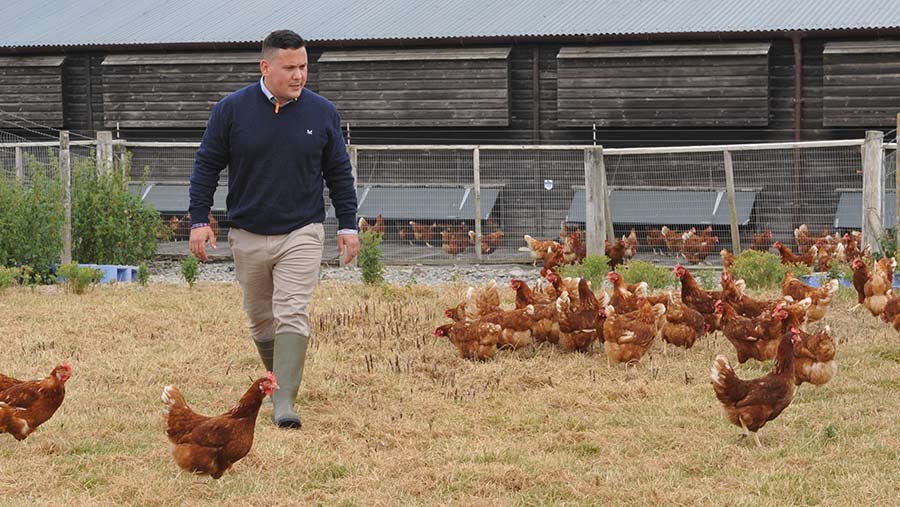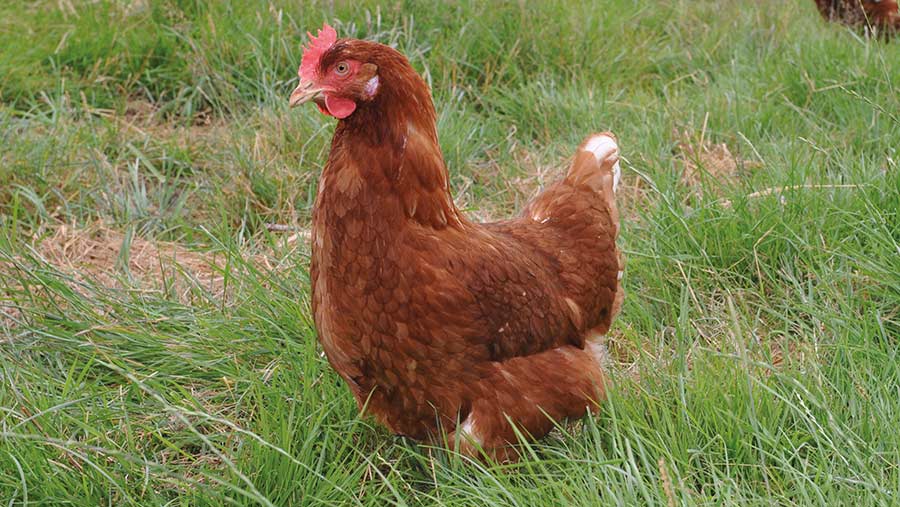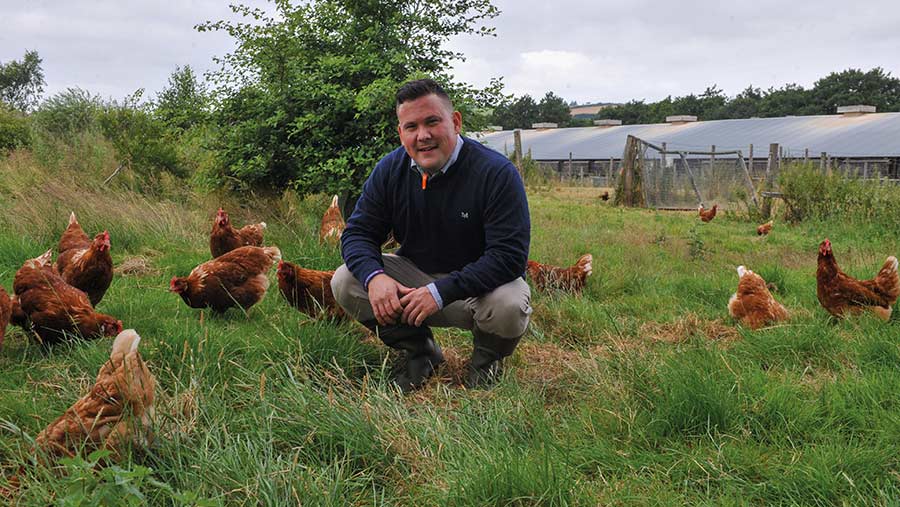7 tips for new entrants from a first-time poultry tenant
 © Debbie James
© Debbie James At 18, Tim Clarke set a target to one day farm in his own right – an ambitious goal for someone with no background in farming and no assets to his name.
Now 32, Mr Clarke is producing eggs from a flock of 9,000 organic hens at Nantywellan, a tenanted holding near Llandrindod Wells, supplying eggs to Bowler Eggs.
The farm owners, Geoff and Helen Lewis, had run a free-range egg enterprise on the holding for 12 years until deciding last year to step back from poultry farming and seek a tenant to take on the business.
See also: What the Lion Training Passport scheme means for poultry staff
It is rare for a poultry site to come up for rent, so the opportunity elicited a surge of interest, with 12 applications lodged with land agent McCartneys.
Mr Clarke, a former mechanical engineer, had built up capital running a suckler herd on a county council holding in Knighton and on a rented farm in his home village of Weobley, Herefordshire.
He also generates income from rearing 150-200 calves for Blade Farming.
Here are his top tips for getting in, and getting on, in poultry farming.
7 top tips for new entrants
1. Positive attitude
The Lewises appreciated Mr Clarke’s “go-getting” attitude, coupled with his strong business plan, and in August 2020 the tenancy agreement was signed.
“When I first met Geoff and Helen I laid my cards on the table,” Mr Clarke says. “They could see that I would be putting everything I had into this business, that it would be my whole world.”

Mr Clarke has continued with Hy-line Plus birds, which the farm had used before his tenancy © Debbie James
2. Be committed
He sold cattle to help fund the enterprise, switching one of his farm rentals to arable production instead of beef, and started egg production in March 2021.
“I went from having a full-time paid job and having cattle to taking on something that was new to me and required a long-term financial commitment,” he says.
“The investment is significant: the rent, birds, electricity, feed. The initial investment was around £100,000, but I couldn’t be happier.’’
The tenancy came with flat-deck housing for 9,000 hens, divided into three sheds, and a 15-acre range surrounded by a perimeter fence to keep out predators.
Mr Clarke has populated the sheds with Hy-line Plus birds, at a cost of about £6/bird for a 16-week-old pullet.
These had been Mr and Mrs Lewis’ breed of choice, and he liked their credentials as hardy, high-producing birds – previous flocks at the farm laid an average of 320 eggs a year.
Mr Clarke’s own flock was in full lay at 21 weeks.
3. Take on training
With no previous experience of poultry, he acquired knowledge by spending one day every week at the farm from August onwards, later increasing his visits to two or three times weekly before finally taking over.
“I gained a massive amount of knowledge in those six months,’’ he says.
He also had formal training in some aspects of poultry health and welfare from his feed supplier, Noble Foods, and from Bowler Eggs.
4. Focus on the flock
Mr Clarke’s number-one priority is his hens. He doesn’t allow swearing in the sheds because he says the hens pick up on the negativity in that and it is reflected in their behaviour and, ultimately, their performance.
“You have to have the right attitude,’’ he insists. “We even knock on the door every time we go into the sheds so that we don’t alarm the birds.’’
He also interacts with the birds when he is in the shed. “We have a five-bird interaction policy which means that every time we go into the shed we pick up five birds and interact with them, talk to them and generally fuss over them.

© Debbie James
“They get used to being picked up and the human contact, and they are very calm. When we are weighing them people can’t believe how quiet they are.’’
This approach has also helped to reduce the incidence of floor laying.
“If there is a bird that looks like she is going to lay we shoo her on and that trains her.’’
Every floor walk is recorded to allow Mr Clarke to understand the pattern of floor laying and to intervene.
This combination of factors has helped him to reduce floor eggs to 30-40 a day in each shed.
5. Make communication a priority
Mr Clarke may be just months into the tenancy, but he has already picked up ideas on how agreements can work best for everyone involved.
Communication, he believes, is key. “If you have a situation in which both parties aren’t talking, that’s when wires can get crossed and things can start to go wrong.
“I have a fantastic relationship with Geoff and Helen. They come up to the farm every day which means they can still take an interest in what is going on but without having all the work that goes into running a business. It works for everyone.’’
6. Listen to advice
Mr Clarke says the advice and support he has gained has put the business on a sound footing – he credits his brother, Gareth, who works for him, Mr and Mrs Lewis, Noble Foods, Bowler Eggs and his family and friends.
“I have always tried to be someone who listens to opinions,” he says. “I don’t necessarily always follow the advice I am given, but I will always listen.’’
He is also grateful to Gareth Wall of McCartneys, who he approached for advice when the tenancy was advertised and who went through the costing with him.
Mr Clarke advises new entrants to be willing to talk through ideas. “It is important to not be blinkered, to be open and honest about what you have and what you can bring to the enterprise.’’
On that basis, Mr Clarke is confident his business will succeed.
“This has to work because I have put every penny and some more into it, and I couldn’t be happier.’’
His ambition shows no sign of diminishing and he has already been approached with new potential business opportunities. “This is just the beginning; the sky is the limit,” he says.
7. Avoid negativity
“In farming there can be a culture of negativity and that can be difficult for a young person full of enthusiasm and ideas, but I have been very lucky that so many people have taken me under their wing, I hope that one day I can help others in the way I have been helped.”
Mr Clarke has a clear message and words of advice for others who might be inspired to follow the same route: “Never say never. Anything is possible if you want it to happen. Always aim high.’’
